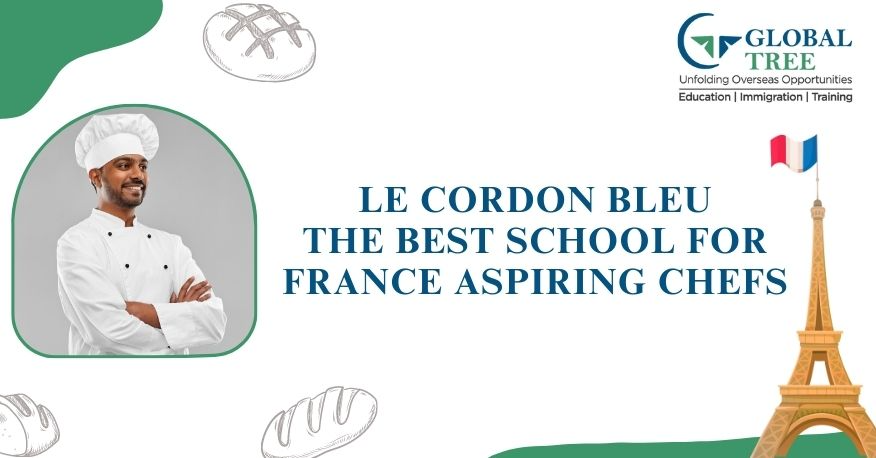LE CORDON BLEU: THE BEST SCHOOL IN FRANCE FOR ASPIRING CHEFS

- The Culinary Legacy of Le Cordon Bleu: A Journey Through Tradition, Excellence, and Innovation
- A Rich History Steeped in Tradition
- Global Expansion and Influence
- Educational Excellence: A Comprehensive Curriculum
- Culinary Arts: The Heart of Le Cordon Bleu
- Hospitality Management: Beyond the Kitchen
- Specialized Courses: Catering to Diverse Interests
- Admission Process for International Students at Le Cordon Bleu
- Tuition Fees (in EUR and INR)
- Cultural Significance and Global Influence
- State-of-the-Art Facilities: A Realistic Culinary Experience
- A Thriving Student Life and a Strong Alumni Network
- Continuing Education and Lifelong Learning
- Conclusion: A Legacy of Excellence
The Culinary Legacy of Le Cordon Bleu: A Journey Through Tradition, Excellence, and Innovation
Le Cordon Bleu is not just a school; it’s a revered institution, a global symbol of culinary excellence that has shaped the landscape of modern gastronomy. Established in Paris in 1895, it has become the pinnacle of culinary and hospitality education, renowned for its rigorous training in French haute cuisine.
This illustrious school has grown from its Parisian roots to a network of over 35 institutes in 20 countries, educating more than 20,000 students annually. With a focus on preserving the traditions of French cuisine while embracing global culinary trends, Le Cordon Bleu has created a unique legacy that continues to inspire culinary professionals worldwide.
(Read More: How much does it cost to study a Culinary Arts course?)
A Rich History Steeped in Tradition
The story of Le Cordon Bleu begins with Marthe Distel, the publisher of the culinary magazine La Cuisinière Cordon Bleu. In 1895, she founded the school in Paris, using the name “Le Cordon Bleu,” which translates to "The Blue Ribbon," a term historically associated with the highest standards of excellence in French cuisine.
This name was inspired by the Order of the Holy Spirit, a prestigious French order of knighthood where members wore blue ribbons, symbolising their esteemed status.
From its inception, Le Cordon Bleu aimed to elevate culinary education by offering cooking demonstrations that showcased the latest culinary techniques, including the revolutionary use of electric stoves. These early demonstrations were pivotal in setting the school apart as a leader in culinary innovation. The school quickly gained a reputation for excellence, attracting students from around the world eager to learn the art of French cuisine.
In 1945, Elisabeth Brassart acquired Le Cordon Bleu and revitalised it after the devastation of World War II. Under her leadership, the school expanded its curriculum and began to develop its global presence. Brassart’s vision was instrumental in transforming Le Cordon Bleu into a world-class institution, laying the foundation for its future growth.
(Suggested Read: Top 10 Must-see attractions in Germany)
Global Expansion and Influence
As the mid-20th century progressed, Le Cordon Bleu solidified its status as a premier culinary institution. By the late 20th century, the school had opened campuses in major cities worldwide, including London, Tokyo, New York, and Sydney. This expansion allowed Le Cordon Bleu to offer its prestigious programs to a diverse student body, reflecting the global nature of the culinary arts.
Despite its global reach, Le Cordon Bleu has remained deeply rooted in its French heritage. The school’s curriculum emphasises classical French cooking techniques while incorporating local cuisines and culinary traditions from its various locations. This blend of tradition and innovation has enabled Le Cordon Bleu to stay relevant in an ever-changing culinary landscape.
Today, Le Cordon Bleu continues to adapt to the evolving needs of the culinary and hospitality industries. The school has introduced specialised programs and online courses, catering to the demands of modern students who seek flexibility in their education. Whether on campus or online, Le Cordon Bleu’s programs are designed to equip students with the skills and knowledge needed to excel in the competitive culinary world.
(Know More: Check out the highest-paid jobs in France)
Educational Excellence: A Comprehensive Curriculum
Le Cordon Bleu’s educational offerings are as diverse as its student body, ranging from foundational programs in culinary arts to advanced degrees in hospitality management. The school’s curriculum is designed to provide students with a well-rounded education that combines theoretical knowledge with practical skills.
| Program | Description | Duration | Focus Areas |
|---|---|---|---|
|
Grand Diplôme® |
Comprehensive program combining both cuisine and pastry training. |
9 to 12 months |
French cuisine, pastry arts |
|
Diplôme de Cuisine |
Focuses on classical French cooking techniques, from basic to advanced levels. |
6 to 9 months |
Cooking methods, sauces, knife skills |
|
Diplôme de Pâtisserie |
Concentrates on pastry arts, including desserts, pastries, and confections. |
6 to 9 months |
Dough preparation, chocolate work, sugar art |
|
Bachelor of Business in Hospitality Management |
Combines culinary skills with business management for the hospitality sector. |
3 years |
Financial management, marketing, operations |
|
Master’s Programs in Hospitality Management |
Advanced studies focusing on strategic management and global hospitality trends. |
1 to 2 years |
Strategic management, leadership, trends |
|
Wine and Spirits Education |
Specialized courses in wine tasting, food pairing, and the business of wine. |
Varies by course |
Wine regions, grape varieties, wine service |
|
Nutrition and Gastronomy |
Explores the relationship between food, health, and culinary practices. |
Varies by course |
Nutrition, health-conscious cooking |
|
Plant-Based Culinary Arts |
Courses focused on plant-based cooking techniques and nutrition. |
Varies by course |
Vegetarian and vegan dishes |
|
Online Learning |
Flexible courses covering various culinary topics for both amateur cooks and professional chefs. |
Varies by course |
Various culinary topics |
Culinary Arts: The Heart of Le Cordon Bleu
At the core of Le Cordon Bleu’s programs lies its culinary arts training, which is renowned for its rigorous approach to French cuisine. The flagship program, the Grand Diplôme®, is a comprehensive course that combines both cuisine and pastry training. This prestigious diploma is widely regarded as a hallmark of culinary excellence and is often pursued by those aspiring to become top chefs.
(Note: Does baking fill your mind and heart with excitement? If so, you should definitely explore the baking course to study abroad!)
The Grand Diplôme® program typically spans 9 to 12 months and covers a wide range of culinary techniques, flavor profiles, and presentation skills. Students learn everything from basic knife skills to advanced cooking methods, ensuring they graduate with a deep understanding of both the art and science of cooking.
For those who wish to specialize, Le Cordon Bleu offers the Diplôme de Cuisine and the Diplôme de Pâtisserie. The Diplôme de Cuisine focuses on classical French cooking techniques, providing students with hands-on experience in a professional kitchen setting. The program emphasizes the importance of mastering the fundamentals, such as sauces, soups, and meat preparation, before moving on to more complex dishes.
The Diplôme de Pâtisserie, on the other hand, is dedicated to the art of pastry. Students learn to create a wide range of desserts, pastries, and confections, mastering techniques such as dough preparation, chocolate work, and sugar crafting. This program is ideal for those who are passionate about the sweet side of the culinary arts and wish to pursue a career as a pastry chef.
Hospitality Management: Beyond the Kitchen
Recognizing the growing importance of business acumen in the culinary and hospitality industries, Le Cordon Bleu also offers comprehensive programs in hospitality management. These programs are designed to prepare students for leadership roles in restaurant management, hotel operations, and event planning.
The Bachelor of Business in Hospitality Management is an undergraduate program that combines culinary skills with business management principles. Students learn about financial management, marketing, and operations within the hospitality sector. The program includes internships and hands-on projects, allowing students to gain real-world experience and apply their knowledge in a practical setting.
For those looking to advance their careers, Le Cordon Bleu offers master’s programs in hospitality management. These programs focus on strategic management, global hospitality trends, and leadership, equipping graduates with the skills needed to succeed in high-level management positions.
Specialized Courses: Catering to Diverse Interests
In addition to its core programs, Le Cordon Bleu offers a range of specialized courses that cater to specific interests within the culinary field. These courses allow students to deepen their knowledge in areas such as wine and spirits education, nutrition and gastronomy, and plant-based culinary arts.
The wine and spirits courses, for example, cover wine tasting, food pairing, and the business of wine. Students learn about different wine regions, grape varieties, and the art of wine service, making this program essential for those looking to work in fine dining or hospitality settings where wine knowledge is crucial.
As consumer preferences shift towards healthier and more sustainable food choices, Le Cordon Bleu has also introduced courses in nutrition and plant-based culinary arts. These programs explore the relationship between food, health, and culinary practices, teaching students how to create balanced and health-conscious dishes. The plant-based culinary arts program, in particular, has grown in popularity as more consumers seek vegetarian and vegan options.
(Read More: Explore Hotel and Hospitality course abroad)
Admission Process for International Students at Le Cordon Bleu
- Application Submission:
- Online Application: International students start by submitting an application through the official Le Cordon Bleu website. The application form typically requires personal information, educational background, and the choice of program.
- Required Documents: Applicants need to provide the following:
- Proof of Education: High school diploma or equivalent.
- Language Proficiency: Proof of proficiency in the language of instruction (usually English or French). Accepted tests include IELTS, TOEFL, or an equivalent.
- Passport Copy: A valid passport is essential for processing the application.
- Statement of Purpose: A letter explaining the applicant's interest in the program and career aspirations.
- Letters of Recommendation: Some programs may require one or more letters of recommendation from previous educators or employers.
(Suggested Read: How to write an LOR: In-depth Guide and Free samples)
- Application Review:
- Evaluation: Once submitted, the application is reviewed by the admissions committee. This process includes verifying academic qualifications, language proficiency, and the overall suitability of the applicant for the chosen program.
- Interview:
- Interview Process: Some programs may require an interview, either in person or via video call, to assess the applicant's motivation, passion for the culinary arts, and fit for the program.
- Acceptance:
- Offer Letter: Successful applicants receive an offer letter, which includes details about the program, tuition fees, and enrollment procedures.
- Visa Application: International students must apply for a student visa. Le Cordon Bleu provides necessary documents, such as the Confirmation of Enrollment, to support the visa application.
- Enrollment:
- Tuition Payment: After accepting the offer, students must pay a deposit or full tuition fees, depending on the program.
- Final Enrollment: Once the payment is confirmed and the visa is granted, students finalize their enrollment by attending orientation and registering for classes.
Read more: France vs Australia: Which country is better for study abroad?)
Tuition Fees (in EUR and INR)
The tuition fees at Le Cordon Bleu vary depending on the program, duration, and location. Below is a general overview with approximate costs in both Euros (EUR) and Indian Rupees (INR).
- Grand Diplôme®:
- Typically ranges from €30,000 to €50,000 (approximately ₹26,00,000 to ₹43,00,000) for the complete program, depending on the campus location.
- Diplôme de Cuisine / Diplôme de Pâtisserie:
- Each diploma can range from €10,000 to €25,000 (approximately ₹8,60,000 to ₹21,50,000), depending on the course length and location.
- Bachelor's Programs:
- Fees for bachelor’s degrees in hospitality management are generally between €20,000 and €35,000 (approximately ₹17,20,000 to ₹30,10,000) per year.
- Master's Programs:
- Master's degree programs can cost between €25,000 and €40,000 (approximately ₹21,50,000 to ₹34,40,000) per year.
- Short Courses / Specialized Programs:
- Fees for short courses and specialized programs, such as wine education or plant-based culinary arts, can range from €1,500 to €10,000 (approximately ₹1,30,000 to ₹8,60,000), depending on the course duration and content.
Note: The conversion from EUR to INR is based on an approximate exchange rate of €1 = ₹86. Exchange rates may fluctuate, so it's advisable to check the current rate when planning. Additionally, these fees are approximate and can vary depending on the specific campus, country, and program chosen. Fees may not include other costs such as accommodation, materials, uniforms, and living expenses. It’s recommended to check with the specific campus for the most accurate and updated information.
(Know More: What is the cost of living in France for students?)
Cultural Significance and Global Influence
Le Cordon Bleu’s impact extends far beyond its educational programs. The school has played a significant role in shaping modern culinary arts and has influenced global perceptions of French cuisine. Its graduates, many of whom have become household names, are a testament to the school’s enduring influence.
Notable Alumni: Culinary Icons
Le Cordon Bleu has an impressive list of alumni, including some of the most famous chefs and culinary personalities in the world. Julia Child, perhaps the most iconic alumna, studied at Le Cordon Bleu in the early 1950s. Her time at the school laid the foundation for her illustrious career as a television personality and author, bringing French cuisine into American homes.
Other notable alumni include Bobby Flay, a prominent American chef known for his expertise in Southwestern and American cuisine; Giada DeLaurentiis, an Italian-American chef and television personality renowned for her Italian cooking; and Jamie Oliver, a British chef and media personality famous for his approachable cooking style and emphasis on healthy eating. These chefs have all credited their education at Le Cordon Bleu as instrumental in their culinary careers.
Influence on Pop Culture and Culinary Media
Le Cordon Bleu has also made its mark on popular culture. The school has been featured in numerous films and television shows, most notably in the film Julie & Julia, which chronicles Julia Child’s culinary journey. This exposure has further cemented Le Cordon Bleu’s status as a cultural icon and a symbol of culinary excellence.
(Read More: What could be the possible reasons for your France visa rejection?)
The school’s influence extends to culinary competitions as well. Le Cordon Bleu has been involved in prestigious events like the Bocuse d'Or, where many competitors have been trained at the school. Additionally, Le Cordon Bleu hosts its own competitions, encouraging students to showcase their skills and creativity on an international stage.
State-of-the-Art Facilities: A Realistic Culinary Experience
Le Cordon Bleu’s campuses are equipped with state-of-the-art facilities designed to provide students with a realistic culinary experience. These facilities include professional kitchens, pastry labs, and dining rooms, all of which are essential for hands-on learning.
The professional kitchens at Le Cordon Bleu are designed to mimic real-world restaurant environments. Students have access to high-quality equipment and tools, allowing them to learn and practice various cooking techniques. The kitchens are staffed by experienced chefs who provide guidance and mentorship, ensuring that students receive the best possible training.
In addition to the kitchens, Le Cordon Bleu’s pastry labs are equipped with specialised tools for baking, chocolate work, and sugar crafting. These labs provide a dedicated space for students to hone their pastry skills, creating everything from classic French pastries to modern confections.
(Suggested Read: List of top professional courses after graduation)
The dining rooms on campus offer students the opportunity to practise food presentation and service. Here, students can serve their culinary creations to guests, gaining valuable experience in customer interaction and fine dining service.
A Thriving Student Life and a Strong Alumni Network
Le Cordon Bleu fosters a vibrant community among its students, who come from diverse backgrounds and cultures. This multicultural environment enriches the learning experience, allowing students to share different culinary traditions and perspectives.
The school encourages students to participate in extracurricular activities, such as cooking competitions, workshops, and culinary events. These activities provide additional learning opportunities and allow students to build connections with peers, instructors, and industry professionals.
Le Cordon Bleu’s career services are another key component of student life. The school offers resume workshops, interview preparation, and job placement assistance, helping students navigate their careers after graduation. Le Cordon Bleu’s strong industry connections often lead to internship and job opportunities for its graduates, making it easier for them to enter the competitive culinary field.
The alumni network at Le Cordon Bleu is vast and influential, spanning the globe. Graduates often stay connected through alumni associations and events, providing valuable resources for career advancement, mentorship, and collaboration. Many alumni have gone on to achieve great success in various culinary fields, serving as inspiration for current students.
Continuing Education and Lifelong Learning
Le Cordon Bleu’s commitment to education doesn’t end with graduation. The school offers advanced courses and workshops for alumni looking to refine their skills or explore new culinary trends. This emphasis on continuing education ensures that graduates remain at the forefront of the culinary industry.
Note: If you're excited to study at Le Cordon Bleu, consider reaching out to study-in-France consultants who can guide you through the entire process.
Conclusion: A Legacy of Excellence
Le Cordon Bleu stands as a beacon of culinary education and excellence, with a rich history that spans over a century. From its humble beginnings in Paris to its global network of schools, Le Cordon Bleu has consistently set the standard for culinary and hospitality education. The school’s comprehensive programs, state-of-the-art facilities, and commitment to tradition have made it a top choice for aspiring chefs and hospitality professionals.
For those seeking a career in the culinary arts, Le Cordon Bleu offers a unique opportunity to learn from the best in the industry. The combination of rigorous training, experienced instructors, and a supportive community creates an environment where students can thrive. Whether pursuing a career in culinary arts or hospitality management, Le Cordon Bleu provides the knowledge and skills necessary to succeed in today’s competitive culinary landscape. This legacy of excellence ensures that Le Cordon Bleu will continue to inspire and shape the future of culinary arts for generations to come.









